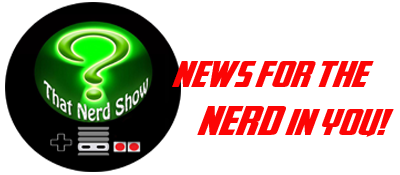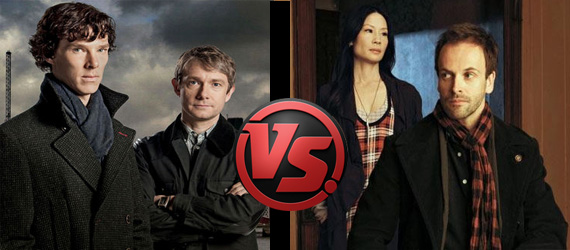When Sir Arthur Conan Doyle first penned the character of Sherlock Holmes in the late 1800’s, I doubt he had any idea that over 100 years later this character would still be one of the most fascinating and closely followed characters ever. In The Universal Sherlock Holmes, by Ronald B. DeWaal he lists that there have been over 25,000 Holmes-related productions and products. In recent years there has definitely been a renewed interest in this character, first with the movie versions, in which Robert Downey Jr. stars as both an eccentric and somewhat unhinged genius, and then more recently with the BBC and CBS shows Sherlock and Elementary respectively. There have been many different interpretations of this character throughout the years and while most have sought to embrace similar characteristics and traits, I find it most interesting to see the different directions that these two latest television reboots have taken.
Although I find both series entertaining and would not discourage users from watching either, I do have to say there is an intensity and depth to Sherlock that I feel Elementary is lacking. There are many factors that contribute to this. One of which is the time allotted to Sherlock—88 minutes versus the 50 minutes or so that Elementary aires—which allows each episode to be almost a movie in length and gives the audience much more of a chance to develop bonds with the characters and the characters more time to be developed as well. However, I feel the biggest factors attributing to this lack of intensity stem from the differences in characters and setting. Although it is a formidable challenge to both remove the character of Sherlock Holmes from England as well as make Dr. Watson a female and still hope to capture the true essence of what makes Sherlock Holmes “Sherlock Holmes”, I don’t think that in doing so one is able to keep the same elements that truly make Sherlock Holmes.
Although, there are many admirable and interesting things happening within Elementary, such as the characters of Captain Gregson and Detective Bell, and the decision to make Irene Adler and Moriarty one and the same, it seems to be missing some of the intensity, drama and eccentricity that is inherent within the BBC’s Sherlock. Johnny Lee Miller and Lucy Liu do a very respectable job in portraying the characters they have been asked to portray and the difference in their relationship starkly contrasts from that of the Sherlock and Holmes played by Benedict Cumberbatch and Martin Freeman. Part of me likes their closeness and that the series started with Lucy Liu as a sobriety companion and then later transformed her into his protégé, and yet in taking this liberty CBS has somehow lost some of the essence from the original Sherlock Holmes.
Let’s compare each series side by side and notice all of the main differences both good and bad and see what makes both series tick.
First, Benedict and Johnny Lee both do an excellent job of playing an eccentric and egotistical genius. Their methods are bizarre, their arrogance is insurmountable and their genius undeniable. However, that is where the similarities end. In the case of Johnny Lee Miller, his character is a recovering drug addict who had once been so deeply addicted (do to what he perceived to be the murder of his lover) that he was both institutionalized and later given a “sober companion” from his father as part of his recovery. He is a tremendous womanizer, and well known for his sexual prowess. His relationship with his father is quite often mentioned and it is apparent that there are issues there but the illusive father is never shown. His relationship with his brother, Mycroft, has also been somewhat strained, but thanks to Dr. Watson and a series of events it seems to be on the mend. Benedict Cumberbatch on the other hand is not a recovering drug addict, although he struggles to stay away from cigarettes, and his father has not been mentioned in the series at all so far. He lives on his own means as opposed to Johnny Lee’s townhouse, which his father owns. He is also the opposite of a womanizer and several times during the series it has been alluded to that he is in fact a virgin. There is no proof of this either way, but other than Irene Adler, he doesn’t’ seem to be very interested in women at all. The BBC seems to enjoy leaving lingering thoughts such as “virgin” and even “homosexual” up to its viewers, but more than likely it is more interested in focusing on Sherlock the consulting detective than it is in showcasing his love life.
Then we have Lucy Liu and Martin Freeman. I do enjoy both of these actors tremendously but their take on the illustrious Dr. Watson is very different. I like how Lucy Liu is strong, confident and intelligent and many times both challenges Sherlock and causes him to evaluate who he is as a person. However, because she is a woman, and her background as a doctor is not from the war it is very different than the character that Conan Doyle first penned. It also leads to random plot twists, such as a brief affair between her and Mycroft, which would obviously never happen in the BBC series. There is something appealing about her being Sherlock’s protégée and her development as a detective, but again because of her gender the audience is always left wondering if a romantic interaction awaits her and Sherlock, and thus the deep friendship is always seethed with some sexual tension. Martin Freeman, on the other hand, seems much more on point with what Conan Doyle originally had in mind. A former solider and doctor, who is both continually amazed by Sherlock’s genius and astounded by his lack of common sense and civility. In the BBC’s version, Martin and Sherlock start off on rather a different footing as they are basically put together for need of housing and splitting the rent. Sherlock encounters Dr. Watson at a time when he is struggling to transition to society and finds himself extremely bored in contrast to the excitement he once felt in the army. Although, Benedict’s character seems to be a little less respectful of Dr. Watson’s intelligence and skills than Johnny Lee Miller’s character, as the series progresses it is obvious that there is a deep bond and affection there although it is more formal and not discussed.
Both series make the character of Irene Adler a formidable one, although Elementary’s decision to combine her with the character of Moriarty is interesting. Maybe because it combines Sherlock’s greatest foe with his greatest love, thus making it even harder for him to think rationally and logically around her. Theirs is a complicated relationship and what will happen with it remains to be seen. In Sherlock, Irene Adler is separate from the character of Moriarty which somewhat lends to the intrigue because we are not entirely sure as to what her fascination with Sherlock is. Her profession lends her to be a dominatrix and deal with mainly powerful men and yet she self-proclaims herself “gay”, so why the fascination with Sherlock? Why his fascination with her? Both seem to have a mutual respect and attraction, and yet it is not yet known if they will be enemies, friends or lovers. In both series Irene Adler is a complicated woman and not to be trifled with and yet the Irene in Elementary seems more unhinged and powerful. She does not need Sherlock to rescue her as in the case with the Irene from the BBC.
The way these two actresses portray Irene Adler in a different light seems to also lend a different aspect to the character of Sherlock himself. The Irene Adler in Elementary has more of a dysfunctional relationship with Sherlock. The two seem to know how horrible they are for each other, like a drug addiction, and yet neither one can give the other up. It seems to be more of an emotionally abusive relationship. Although the Irene Adler in Sherlock is also a powerful woman and fascinated with Sherlock there is a different intriguing element to their interactions and their coyness. It is still a dysfunctional relationship in many ways, I am not entirely convinced Sherlock can have any other kind of relationship, but it does not seem nearly as abusive as Elementary’s version.
Even minor characters vary in these series. Because Elementary is set in New York and not England, it has the characters of Captain Gregson and Detective Bell, both of whom I like. It also casts the character of Lestrade as a pathetic charlatan and rather obnoxious, whereas in Sherlock Lestrade respects Holmes immensely and seems very competent and intelligent. Furthermore, Mycroft Holmes, played by Rhys Ifans in Elementary and Mark Gatiss in Sherlock, differ vastly in both their careers and their personalities. A restaurant entrepreneur and a major government official are very different directions and lead to major differences in future storylines. However, in the series of Sherlock there are also the characters of Molly and Mrs. Hudson who add an element of endearment to the overall cast structure of the show. As likeable as Captain Gregson and Detective Bell are they are still associated with Sherlock’s work like in the case of Elementary whereas the sweet, dottering old lady of Mrs. Hudson gives a glimpse into Sherlock at home, whilst the only people Sherlock associates with in Elementary have to do with his work or his past drug addiction such as his sponsor. The “at home” element lends to more of a rounded and 3-D image of Sherlock Holmes.
Other than the cast and crew, one of the other main differences lies within the setting of the story itself, and the camera techniques. The cold, harsh streets of New York, while ideal for crime, also become increasingly similar to past shows such as Law & Order, CSI, and even Castle. It is very Americanized and therefore loses a little of the Sherlock persona. Whereas the mixture of old and new England with modern day advances seems to keep Sherlock himself and simultaneously thrust him in the 21st century as well. Even the filming itself, the focusing in on tiny details and the rapid time release images in the opening scenes of the BBC series Sherlock tend to contribute to how Holmes perceives life and the details around him, something that is missing from Elementary.
The reasons for changing the series so dramatically as in the case with Elementary seem to be more American than anything. Obviously CBS was seeking to reinvent and modernize this detective classic and in doing so took many of their own liberties. In my opinion some of these liberties work and some do not. But the real question remains, did Sherlock Holmes need to be reinvented at all? Modernization of course must come with the territory, as the times have changed dramatically in the last 100 years and even the BBC’s Sherlock has taken into account the internet, blogging and many other 21st century norms, but it has not changed the core elements that make Sherlock Holmes who and what he is. Somehow in seeking to make Sherlock Holmes more appealing to American society I feel that the CBS series has lost some of the quiet intensity and deeply thought provoking scenarios that are so beautifully depicted in BBC’s Sherlock, especially in capturing Sherlock’s nemesis Moriary, which is played by Andrew Scott. Although I admire CBS for their attempt at an Adler/Moriarty meld, the BBC has truly capture an evil genius and formidable opponent for the great Sherlock Holmes in the character portrayed by Andrew Scott. The idea of a consulting criminal to be the polar opposite of a consulting detective is a brilliant one and brilliantly executed by Andrew Scott.
So, exactly what does all of this comparing and contrasting mean for all of the Sherlock fans out there? Well if you like good detective shows and drama, Elementary will do just fine. There is good acting and even most of the story lines are interesting and somewhat compelling. However, if you long for the intensity and master story telling associated with the name of Sherlock Holmes and the intricacies of fascinating plots that keep you guessing up until the last moment, chances are you are better suited for Sherlock. As to the future of this timeless character? Well, only time will tell.







